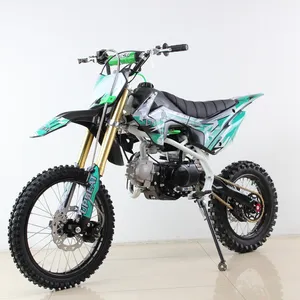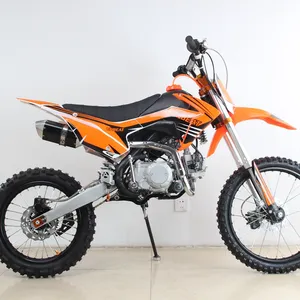(1038 products available)



























































































































































































With the increasing popularity of Mini bikes and the bike culture in general, pit bikes have become a staple. Pit bikes are basically small motorcycles that are designed for off-road use. They are smaller and more manageable compared to traditional dirt bikes. Because of their size, they are popular with kids and adults. Speaking of size, pit bikes come in different sizes and types. On Chovm.com, buyers can find pit bikes with 110cc engines all the way to 300cc. In this case, the focus will be on pit bike 250cc engine.
Four-stroke pit bike engines
Four-stroke engines are the most popular choice for pit bikes. They are popular because of their longevity, reliability, and low maintenance needs. In general, four-stroke engines have a more complex design and are heavier compared to their two-stroke counterparts. A four-stroke pit bike 250cc engine is characterized by four distinct strokes: intake, compression, power, and exhaust. The four-stroke cycle allows for more efficient combustion of fuel, which translates to better power and torque. Riders can also enjoy better throttle control and increased efficiency. Because of these advantages, four-stroke engines are commonly used in competitive settings where precision and control are important.
Two-stroke pit bike engines
Two-stroke engines are also popular choices for pit bikes, although not as popular as the four-stroke engines. This is because the two-stroke engines require a more complicated fuel mix. Riders have to mix gasoline with oil before fueling the engine. This can be a deal breaker for many people. That said, two-stroke engines are lighter and simpler compared to the four-stroke engines. They have fewer moving parts and are generally lighter. A two-stroke pit bike 250cc engine has a two-stroke cycle that combines the intake and exhaust strokes. This results in more power strokes per revolution of the crankshaft, increasing the power output. Riders can enjoy a snappier power delivery and increased acceleration.
Ultimately, the choice between a four-stroke engine and a two-stroke engine boils down to personal preferences and the riding style. For instance, competitive riders who need precision control and efficient power delivery will lean towards the two-stroke engine. Casual riders, especially kids, can use the four-stroke engine with no problem.
Oil Changes:
Regular oil changes are essential for the health of the pit bike's engine. Oil changes every 20-30 hours of use or at least once a month, whichever comes first, help keep the engine clean and lubricated. The new oil replaces the used oil that accumulates debris and keeps the engine running smoothly. Be sure to use the recommended oil type and filter for the bike.
Air Filter Maintenance:
The air filter prevents dirt and dust from entering the engine. Checking and cleaning it every 10-15 hours of riding or more often in dirty conditions is important. A clogged air filter restricts airflow, reducing engine performance. Tapping out excess dirt or washing with mild soap removes debris. A clean air filter ensures the engine gets the air it needs to run efficiently.
Valve Adjustments:
The valves control airflow in and out of the engine cylinders. Over time, the valve gaps can change, affecting engine performance. Inspecting the valves and adjusting the gaps as needed per the owner's manual schedule is important. Properly adjusted valves optimize engine efficiency and longevity. Follow the manual for the correct valve clearance specs and adjustment procedure.
Fuel Quality:
Using quality fuel is important for pit bike engine health. The owner's manual will specify the required octane level. Typically, 87-octane unleaded fuel is recommended. Avoid using lower octane fuels, as they can cause knocking and damage over time. Higher octane fuels are not usually necessary unless recommended for high-performance models. Sticking to the specified fuel type ensures the engine runs smoothly and reliably.
Cooling System Care:
Pit bikes with liquid cooling require maintenance of the cooling system. Checking the coolant level regularly and topping up as needed is important. The coolant helps transfer heat from the engine to the radiator, where air flow cools it. Low levels reduce cooling efficiency, risking engine overheating. Also, inspecting hoses for leaks or wear and replacing them per the schedule is important. Healthy hoses are crucial for the proper flow of coolant through the system.
Chain Maintenance:
The power from the engine is transmitted to the wheels through a chain. Regularly lubricating the chain with quality chain lube is important for smooth power delivery and bike operation. A well-lubed chain lasts longer and requires less effort to pedal.
For any business looking to source 250cc pit bikes, here are a few tips to keep in mind.
It is important to replace the 250cc pit bike engine when it is damaged to ensure that the bike continues to function well. Some of the tools needed for the replacement are:
Here is a step-by-step guide on how to replace the pit bike 250cc engine:
Preparation
This includes turning off the engine and ensuring that it is cool. The pit bike is then positioned in a way that it is stable and accessible. Also, the new 250cc engine has to be prepared before installation.
Disconnect the old engine
This involves disconnecting all the cables, hoses, and wires connected to the old engine. The gas and oil lines are disconnected, and the engine's electrical connections are also disconnected.
Remove the old engine
The socket set and wrenches are used to remove the bolts that secure the engine to the pit bike's frame. After that, the engine is lifted out of the frame carefully and then placed away from the bike.
Install the new engine
The new engine is installed by placing it in the pit bike's engine bay and then securing it to the frame with bolts. After that, the bike's electrical, cooling, and fuel systems are connected to the new engine.
Final checks
Once the new engine is installed, the pit bike is checked to ensure that all systems are working properly. This is done by checking for leaks, ensuring that the engine runs smoothly, and then adjusting the bike's controls if necessary.
Q1: How fast is a 250cc pit bike?
A1: The speed of a 250cc pit bike depends on various factors such as the bike's condition, terrain, and rider's weight. On average, a 250cc pit bike can reach a maximum speed of 50 to 60 mph.
Q2: How can buyers maintain a 250cc pit bike?
A2: To maintain a 250cc pit bike, inspect and change the oil regularly, clean and adjust the air filter, inspect and adjust the tire pressure, clean the bike regularly, and inspect and tighten loose bolts and nuts.
Q3: Can an adult ride a 250cc pit bike?
A3: Yes, an adult can ride a 250cc pit bike. However, the adult's experience in handling pit bikes is important because the 250cc pit bike is more powerful compared to the 110cc pit bike.